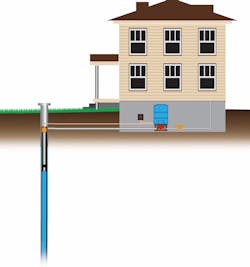NGWA Regulatory Update 2020: Tracking PFAS & Groundwater Legislation
About the author:
Merritt Partridge is president for the National Ground Water Association. Partridge can be reached at [email protected].
More and more Americans depend on groundwater as their safe drinking water supply source. In many cases, private wells are not only the safest and most reliable source of water, they may be the only one available. According to the U.S. Geological Survey, groundwater use in the U.S. increased by 8.3% while surface water use declined by 13.9% from 2010 to 2015. Unfortunately, per- and polyfluoroalkyl substance (PFAS) contamination threatens the sustainability of our nation’s groundwater supply, affecting millions of Americans.
Manmade PFAS chemicals are used in firefighting, stain resistance, water repellents and other industrial applications. PFAS chemicals all have elemental bonds of fluorine and carbon that are particularly strong and long-lasting, not breaking down easily in the environment nor in people’s bodies, leading to potential adverse health effects.
The Relationship Between PFAS & Groundwater
As concern over PFAS emerged, the National Ground Water Association (NGWA) gathered a team of scientists and hydrogeologists to study the issue and its impacts on groundwater. In 2018, in collaboration with a team of experts, NGWA published Groundwater and PFAS: State of Knowledge and Practice, which was one of the first PFAS guidance documents to be published.
As NGWA continued to study the potential health impacts of PFAS, it became clear the issue would require an aggressive governmental approach through increased funding of research and potential federal regulations on the chemicals. Sampling of water systems estimate that roughly 15 million people live in areas that exceed health advisory levels, and private well owners are at an even larger disadvantage due to the high costs of testing and treating for PFAS contamination.
NGWA has been a leader in the industry in working to educate Congress on the potential impacts of PFAS. For the last three years, the association has made PFAS education a staple of its annual “Fly-In” in Washington, D.C., and in early 2020, held a Congressional PFAS Briefing for members of Congress and their staffs. Since beginning educational outreach, PFAS has gone from an obscure topic for most members of Congress to an issue that is now a top priority.
Looking Forward
While Congress has recently made positive steps toward effectively addressing PFAS through funding research, site cleanup and potential regulations, there is still much work to be done on addressing the needs of private well owners. An estimated 35 to 40 million Americans depend on private water wells, according to census data, and there are currently few systems in place to provide them assistance in facing PFAS contamination.
In 2021, NGWA will be heavily focused on working with the newly elected Congress on avenues to dedicate financial and technical resources to private well owners for testing and treating PFAS. Congress must start accepting the fact that a solution to addressing PFAS without considering private well owners is not a real solution. Additionally, while we have begun to see private wells being considered in recent PFAS legislation, there are more potential solutions that could be enacted.
NGWA is excited to work with Congress on finding new ways to assist private well owners, and NGWA feels there are reasonable and measured actions that can be taken. Congress should increase funding to local health departments to test private water wells and fund more educational outreach on the potential of PFAS contamination, especially in high-risk areas. More funding should be allocated to research source point remediation technology for private wells, and well owners should also receive direct financial assistance through tax rebates on the products they purchase to test and treat PFAS in their water.
In the coming years, we expect funding for PFAS research and remediation to increase due to new legal settlements and public outcry. It is imperative that private well owners receive their fair share of the funding and are afforded the right to clean and safe water. It is smart policy and the right thing to do.
PFAS contamination is a worldwide health dilemma, which impacts almost every human on earth. The problem can seem insurmountable in its scope and complexity, but by working together and being solution-focused we can meet the challenge. We encourage everyone to talk to their members of Congress and urge them to ensure private well owners receive the assistance they need to fight this contamination.
